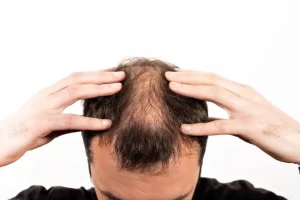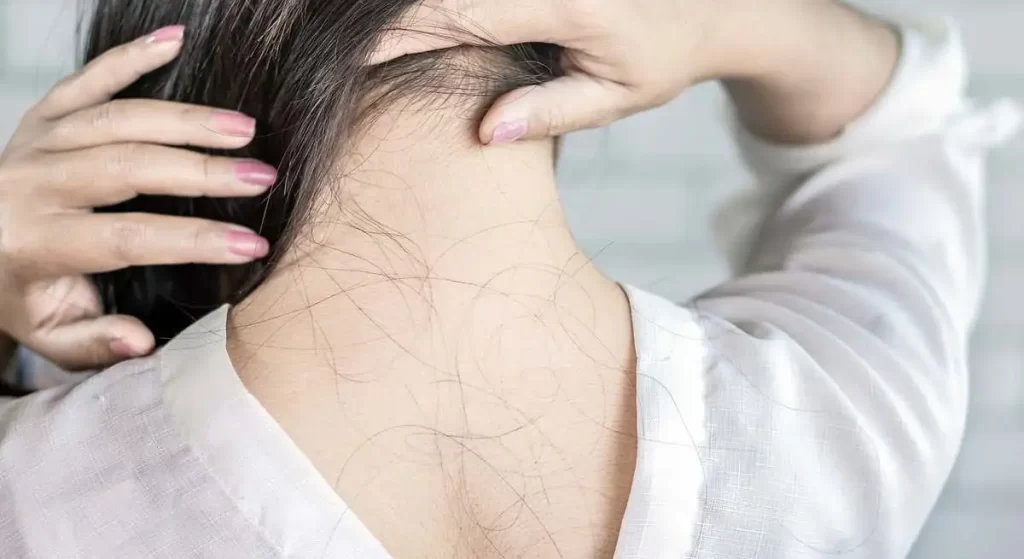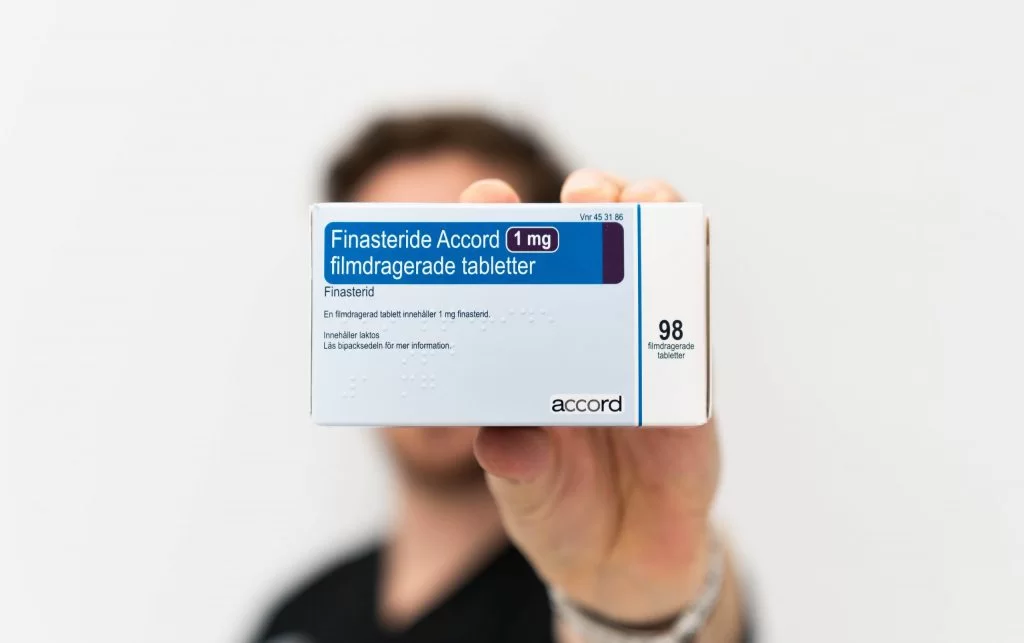Table of Contents
ToggleAt Kopelman Hair, patients often ask about medications that cause hair loss. The answer is yes — antidepressants, blood thinners, acne treatments, chemotherapy drugs, high blood pressure medicines, and even birth control pills can trigger shedding as a side effect. Most cases involve temporary c, though some may be more severe.
Drug-induced hair loss occurs when medications disrupt the growth cycle of hair follicles. This type of hair loss may appear as thinning or sudden shedding, but hair regrowth often begins once treatment stops.
Identifying the type of medication involved and discussing treatment options with specialists such as Dr. Kopelman helps patients manage recovery safely.
Key Takeaways
- Most cases of medication-induced hair loss are temporary, with hair regrowth often beginning three to six months after stopping the drug.
- Drug categories associated with shedding include antidepressants, blood thinners, acne treatments, chemotherapy drugs, and certain high blood pressure medications.
- Hair loss may affect men and women differently, with hormones, birth control pills, and health conditions influencing severity.
- Patients should seek medical advice before changing prescriptions and may benefit from different treatment options, ranging from topical medicines to restorative procedures.
Which Medications Can Lead to Hair Loss?
Types of Medicines Linked to Hair Loss
Some drugs have side effects that include thinning or shedding of hair. Below are common categories of type of medication linked to this issue:
- Antidepressants: fluoxetine, sertraline, paroxetine.
- Blood thinners: warfarin, heparin.
- Acne and skin treatments: isotretinoin, high-dose vitamin A.
- Chemotherapy drugs: cyclophosphamide, doxorubicin.
- Antifungal or antimicrobial drugs: terbinafine, ketoconazole.
These examples highlight how medicines prescribed for different health conditions can unintentionally cause hair loss, including diffuse thinning across the scalp. Patients should not stop treatment without guidance, but can discuss options with their doctor.
Common and severe medications that cause hair loss
Other examples include:
- Cancer treatments that directly damage rapidly dividing hair follicles.
- Antidepressants and mood stabilizers that disrupt hormone balance.
- Blood thinners that affect scalp circulation.
- Vitamin A treatments that accelerate shedding.
In most cases, these lead to temporary hair loss, but some can cause more severe forms of drug-induced alopecia.
Meds that cause hair loss in men vs. women
What medications cause hair loss in females may overlap with those affecting men, but hormonal prescriptions such as hormone replacement therapy or birth control pills can make women more vulnerable.
Men often experience more shedding from drugs that affect testosterone pathways. Addressing these differences helps specialists recommend appropriate management.
Which blood pressure medicine causes hair loss?
Among drugs for high blood pressure, some beta-blockers and ACE inhibitors have been reported to trigger hair thinning. Not everyone experiences this side effect, and doctors may suggest alternatives if it becomes a concern.
Can amoxicillin cause hair loss?
Antibiotics such as amoxicillin are not a common cause of shedding. When hair changes do occur, they may be linked more to illness or stress than to the drug itself. A doctor can confirm if the loss is medication-induced hair loss or due to another factor.
How Drugs Affect Hair Growth
Telogen effluvium explained
Many drugs that cause hair loss result in a condition called telogen effluvium. This type of hair loss occurs when hair enters the resting phase prematurely, leading to diffuse shedding two to three months after treatment initiation. Once the drug is stopped, hair regrowth usually occurs.

Anagen effluvium explained
Anagen effluvium is another form of drug-induced alopecia, often linked to chemotherapy drugs. It directly attacks hair follicles in the growth phase, leading to sudden and dramatic loss, sometimes including brows and lashes.
What are the two main hair loss drugs?
The two main hair loss drugs are minoxidil and finasteride. These are treatments designed to promote hair regrowth, not causes of shedding. They remain the standard treatment options for pattern baldness in both men and women.
Will Hair Grow Back After Stopping Medication?
Temporary vs. permanent hair loss from drugs
A common concern is whether medication-induced hair loss is permanent. Most cases are temporary, with hair regrowth beginning within months of discontinuing treatment.
Permanent damage is rare and usually associated with strong chemotherapy that harms hair follicles. For patients unsure of recovery, a specialist can determine if regrowth is likely.
Most people experience temporary hair loss only. Knowing that shedding often reverses can help reduce anxiety. Consultation with a doctor ensures accurate diagnosis and treatment options tailored to the patient.
How Long Does It Take for Hair to Regrow?
Regrowth typically starts within three to six months, though some cases may take up to a year. Recovery may be slower with stronger prescriptions such as chemotherapy.
Monitoring progress helps determine whether the shedding is resolving within the expected timeframe.
Frequently Asked Questions About Medications That Cause Hair Loss
Which medications are most likely to cause hair loss?
How soon after starting medication does hair loss appear?
Will hair always grow back after stopping medication?
How to Stop Hair Loss From Medication
When to see a specialist
Patients noticing unusual shedding should review medications with their doctor. If multiple prescriptions are involved, finding the cause may take time. Specialists in hair restoration can confirm if shedding is due to medication-induced hair loss or another condition.
Treatment and restoration options
Approaches may include:
- Adjusting or switching prescriptions with medical supervision.
- Topical or oral treatments such as minoxidil or finasteride are used to encourage hair regrowth.
- Nutritional support to address deficiencies.
- Hair restoration procedures at Kopelman Hair if shedding persists.
With over 40 years of expertise, Dr. Kopelman provides patients with safe and effective treatment options. His clinical background and experience with drug-induced alopecia ensure advice is both professional and reliable.
Can Supplements Help Reduce Hair Loss From Medication?
Supplements may help when a deficiency contributes to shedding. Biotin, vitamin D, iron, and zinc support hair follicles and may aid recovery.
Excessive doses, such as too much vitamin A, can worsen shedding. Supplement use should always be guided by a physician.
Final Thoughts
Understanding how drugs that cause hair thinning affect the scalp helps patients manage expectations and recovery. While many cases are temporary hair loss, others may require professional care.
Schedule a consultation with Kopelman Hair today to discuss your concerns about medication-induced hair loss and explore the best treatment options for lasting hair regrowth.
























